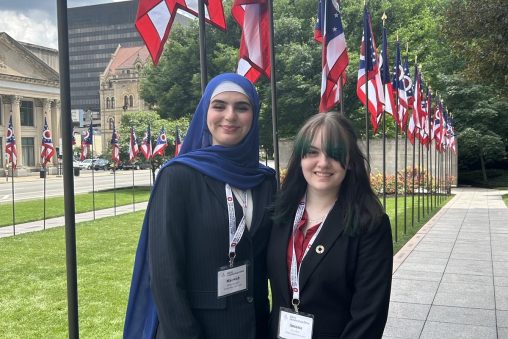
Wright State seniors Marwah Almuzoughi, left, and Amana Koeller were selected to participate in the NEW Leadership program, a nonpartisan leadership academy for college students who want to become more involved in politics and to address women’s underrepresentation in politics and government.
Wright State University students Marwah Almuzoughi and Amana Koeller got a taste for what a life in public service might look like through the NEW Leadership program at The Ohio State University in May.
Sponsored by the John Glenn College of Public Affairs, the five-day, nonpartisan leadership academy is designed for college students who want to become more involved in politics and to address women’s underrepresentation in politics and government.
Almuzoughi and Koeller joined students from 13 Ohio colleges and universities who were recognized by faculty and peers as emerging leaders who engage in their campus and local communities to make a difference.
“I am thrilled that they have this special opportunity to dedicate time and energy to hone their individual communication and leadership styles but also to meet leading women in public service across the state and get to know other outstanding women leaders in our universities,” said Laura Luehrmann, Ph.D., professor of political science and chair of the School of Social Sciences and International Studies at Wright State. “This is a fantastic program, and we look forward to nominating other Wright State student leaders to participate in the future.”
During the NEW Leadership academy, Koeller teamed with a group of her peers on a project to consider solutions to protect evicted tenants in Columbus. The group’s goal, she said, was to create a plan establishing a city ordinance guaranteeing tenants access to counsel during eviction appeals cases in court.
Almuzoughi’s group focused on promoting more accessible voting for students.
“It was really inspiring to meet so many successful women and hear their stories of how they got where they were today,” said Koeller. “Further, it was an opportunity to network with so many people and get direct and personal advice from these role models.”
Born in Tripoli, Libya, where she lived until she was 13, Almuzoughi moved to Fairborn after her dad was accepted into a Ph.D. program at Wright State.
Almuzoughi, a senior majoring in international studies with a concentration in international diplomacy, peace studies and political science, expects to graduate next spring. She plans to attend law school while continuing her career in advocacy, working with nonprofits and in the public sector.
“My passion for understanding politics and conflict stems from my experience growing up in a turbulent environment,” she said. “I believe it is up to us to make the world a better place, not wait for others to do it.”
Almuzoughi holds several leadership positions at Wright State including student body president for the 2024–25 academic year, president of the Muslim Students’ Association, and serving on the Provost’s Student Leadership Council and as an orientation ambassador and First Weekend leader.
She also participated in Wright State’s award-winning Model United Nations program for the past three years, is a member of the African Student Union, and is working with the Dayton Peace Museum to develop a youth program to promote peace locally.
“I have truly enjoyed my experience at Wright State University and consider it my new home,” said Almuzoughi. “I found a supportive community here and grew in many ways.”
She credits faculty in the College of Liberal Arts, especially Luehrmann, Liam Anderson, Ph.D., professor of political science, and Vaughn Shannon, Ph.D., professor of political science, for helping her grow as a student and leader.
“Their support and encouragement, particularly through the Model U.N. program, helped me become more confident and a stronger leader,” Almuzoughi said.
Koeller, who graduated from Wapakoneta High School and the Apollo Career Center, where she obtained a nail technician and esthetic license, in 2022, is a senior majoring in political science, with a Spanish minor.
“I’ve always had a passion for politics and serving my communities, as well as a keen interest in Spanish language and culture,” said Koeller.
She has participated in the Model U.N. program and the Progressive Student’s Coalition and this fall will become a member of the Residential Community Association as the national communications coordinator.
Koeller’s career path, however, was not so clearly defined when she enrolled at Wright State, where she originally intended to major in education. Changing majors to political science was a bold, calculated move on her behalf.
“Ultimately, I told myself that if I was going to change majors to something with a less defined end goal, then I needed to succeed no matter what to get the career that I truly wanted,” she said.

 Wright State to expand nursing facilities to meet workforce needs and prepare more graduates for in-demand careers
Wright State to expand nursing facilities to meet workforce needs and prepare more graduates for in-demand careers  Wright State student-athletes make a lasting impact on local family with more to come
Wright State student-athletes make a lasting impact on local family with more to come  Wright State names Rajneesh Suri dean of Raj Soin College of Business
Wright State names Rajneesh Suri dean of Raj Soin College of Business  ‘Only in New York,’ born at Wright State
‘Only in New York,’ born at Wright State  Wright State president, Horizon League leaders welcome new commissioner
Wright State president, Horizon League leaders welcome new commissioner 